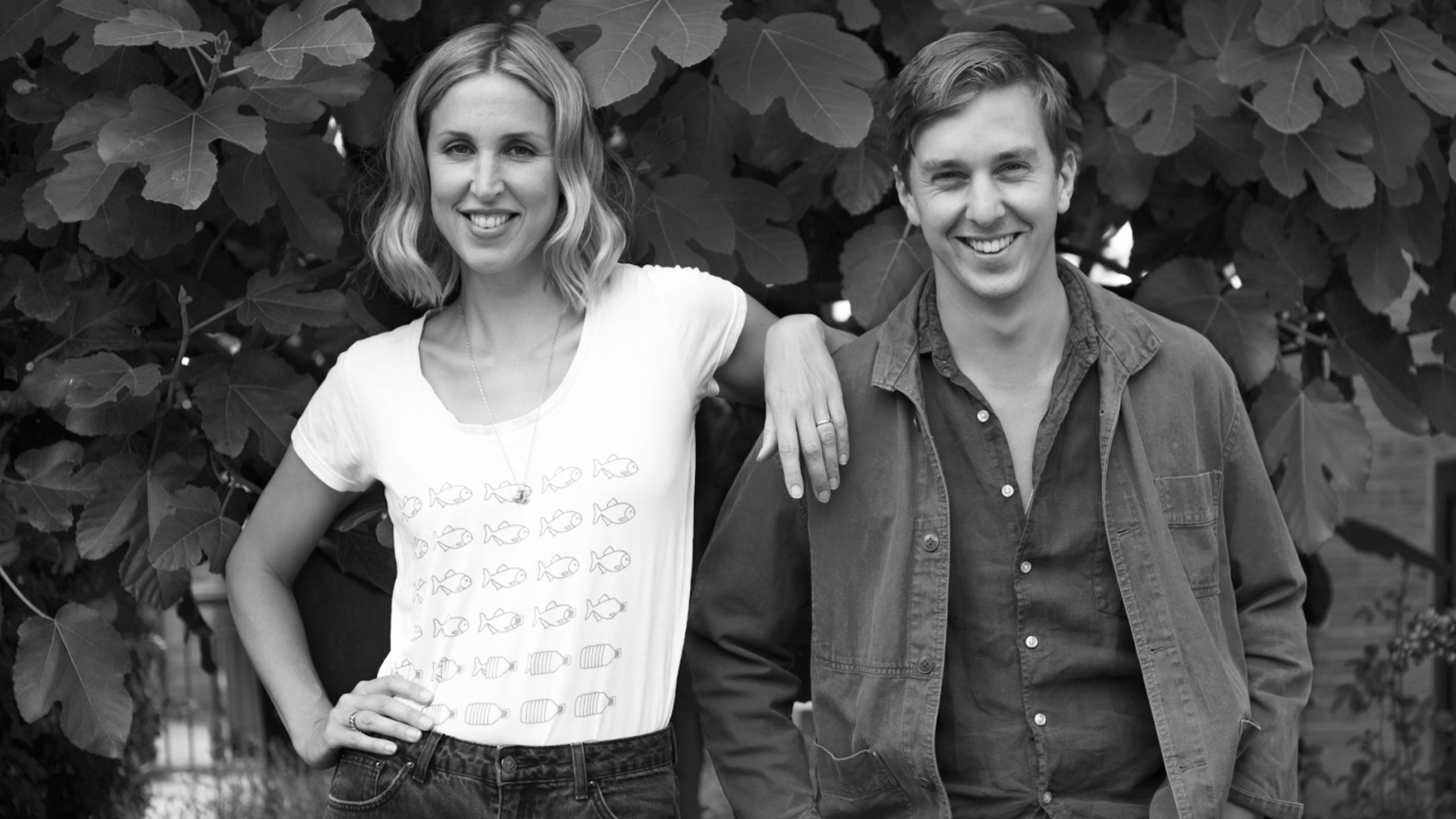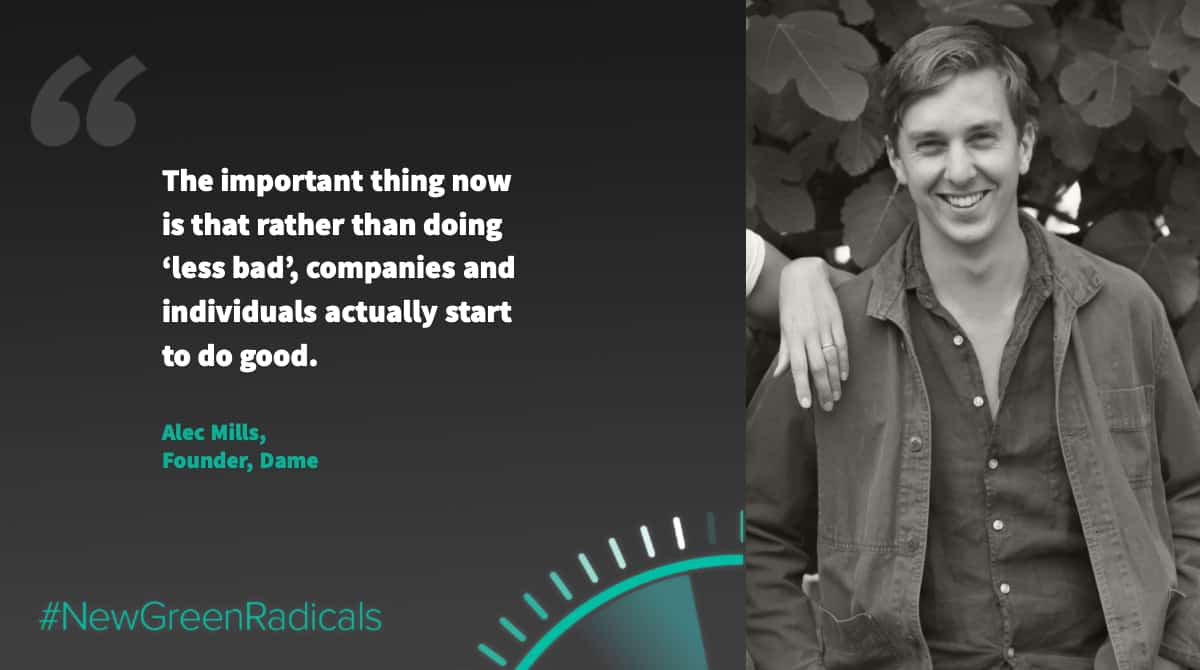New Green Radicals: Alec Mills
Alongside his friend Celia Pool, Alec set up Dame in 2015 to provide organic, plastic- free period products, including what it claims is the world’s first reusable tampon applicator. Alec had previously worked in property and investment management, before founding a sanitary product subscription service which first led him to realise the scale of the impact period products have on the environment.

Do you think it’s important we respond to the climate emergency?
It’s vital. We should have started a long time ago. But equally the important thing now is that rather than doing ‘less bad’, companies and individuals actually start to do good.
How would you define a green radical?
It’s an organisation that thinks outside the box in order to achieve greater sustainability, even potentially at a short-term cost to itself.
Do you regard your organisation as a green radical?
We think differently, and try to do business differently. Nothing that we’re doing is necessarily totally new, but it’s incorporating it into the fabric of the business and innovating with what’s already there that makes us stand out, I think.
How has your organisation taken a radical approach to environmental action?
We’ve created a world-first product that directly tackles single-use plastic. We make packaging out of waste material. We are a B Corp.
We are carbon verified, with no carbon footprint from cradle to grave, and we are shortly to become carbon sequestering.
How do you build the business case for radical change?
It’s been proven time and again that long-termism always yields better results than short-term profiteering. You can see that in companies like Patagonia – companies that really embed themselves in the causes they believe in.
The business case stands for itself as you have a healthier business. For example, because of our mission we attract a lot of talented people who want to come and work for us, which is a massive upside that comes from our vision. We might be radical in the way we go about using materials, but in the end that saves us money. Time and again, thinking radically and sustainably is proven to actually improve your business commercially and on the bottom line.
What’s the biggest barrier to change?
People. If we had more people in this business we would be doing a lot more, so you have to have a good team and support network to make sure you execute what you’re doing well.
I also think you have to take the customer with you; you have to lay out the case to the customer. You can’t just do dramatic things and expect people to come with you, it has to have good branding, look attractive, and feel like something they already do but done better.
How have customers, employees and stakeholders responded?
Really well. We have a very high Net Promoter Score, which is a measure of your customer advocacy. We have a lot of investors who are interested, all our employees join us because they believe in what we’re doing, and our customers believe in our products and brand for similar reasons.

How do you inspire others towards radicalism?
By beating the drum. We took out a page advert in the Evening Standard newspaper [which called on the government to ensure free period products for school students are plastic-free] and managed to get other stakeholders in the space on board, because they also saw there was a failing in the system that we were offering a chance to do something about. A lot of people are looking for change at the moment but just need a channel through which to do it.
Which area of the economy is most in need of radical change?
I think food waste is a huge problem, as is fashion. If we got those two things squared away, the planet would have more breathing space.
What’s the most radical thing you’ve ever done?
We took out the advert in the Evening Standard in the pure belief that we wanted to make a change – there was absolutely no upside for us. It involved rallying people, covering the costs involved, and lobbying the government. It was a very public way of doing that.
Who are the green radicals that inspire you today?
Elvis & Kresse – it’s a brand that makes luxury goods out of decommissioned fire hoses. They’ve put a value on waste materials, and have found a way to make something that was going in the bin totally beautiful and desirable. Their ability to see that value and make it into something else is incredibly radical.
Yvon Chouinard, who is the founder of Patagonia, is also a bit of a personal hero of mine. He wrote a book where he asked when citizens started to become consumers. Everything we make comes at a price – at a cost to resources of the planet – which isn’t being factored into business. He was one of the first people to take the case for the planet into the business world, and argue the two can exist hand in hand.
What one radical thing would you like people to do right now to change our future?
Don’t buy new clothes.
This interview forms part of a series of interviews that were published in a new report, New Green Radicals: The business leaders responding to the climate emergency. The report follows last year’s ‘Meet the Disruptors’ and 2017’s ‘Secrets of the Pioneers’ reports, and this year features interviews with entrepreneurs, leaders and creators who are providing radical solutions to the climate crisis.
The report is produced by Greenhouse PR in association with BusinessGreen and was launched at the BusinessGreen Leaders’ Summit on October 23rd. Follow live on social media with #NewGreenRadicals.
At Greenhouse, we support a wide variety of organisations pioneering climate action. Whether it’s fashion, finance or farming, if you’ve got a great story and need our help to tell it, get in touch with the Greenhouse team on 0117 214 1250 or email info@greenhousepr.co.uk.


